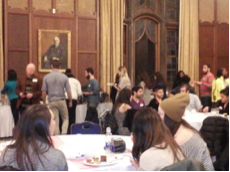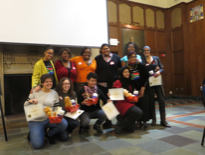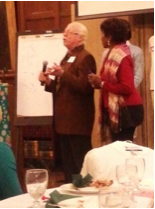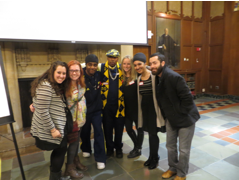Erica:
I was extremely honored to be present at their Graduation. We were very excited to see the group, and they were just as excited to see us. They were in awe of the City of Ann Arbor and the campus of the University of Michigan, and it was an honor to welcome them to campus and be with them as they took in these new experiences. The setup of them coming to campus had the potential of going awry. It could have been presented as an ostentatious lifestyle that they too could obtain one day with enough hard work and dedication, or a model of the unobtainable. Instead, most of the ceremony was led by the communities that were invited. They gave remarks, did the teach-back, and even read poetry. This was a very visual way of expressing our trust in them.

One of our group members, Lamar, was so outgoing and friendly, but was incredibly shy and apprehensive when it came to presenting. He was nervous and almost fearful to teach back. He had a great deal of difficulty saying the word “immunodeficiency”. We practiced with him at the table and a couple of times he actually said the word, for the very first time. We shared with him how much we believed in him and his ability to teach the module. According to Freire, “It is only when the oppressed find the oppressor out and become involved in the organized struggle for their liberation that they begin to believe in themselves. This discovery cannot be purely intellectual but must involve action; nor can it be limited to mere activism, but must include serious reflection: only then will it be a praxis” (Freire, 2012, p. 65). Lamar became involved in the module, which encourages empowerment, and began to believe in himself. It was not enough for him to say he could do it, he had to get up and teach-back. It was not enough to just teach-back, it was important for him to reflect on the experience as well. It was his reflective participation in the module, partnered with our trust and belief in his ability, that was a model of praxis, empowerment, and revolutionary change (Freire, 2012).
Gina:
During the teach-back of the module at the graduation, I recognized many powerful things that were happening in the room. Each group sent representatives up to lead a portion. Because my group did not have anyone from coalition in attendance, I was able to observe what was happening in the room during this time. Prior to the start, I watched the groups consult with the members of my class—my classmates were acting as motivators for them: “you can do this!” and “you KNOW the information, don’t be nervous!” were things commonly being said. Throughout the course, each of us began to recognize that we had earned our privilege “unjustifiably.” It was simply built into society, no matter how unfair it truly was. During this process, we had to trust these individuals to carry out the module. We had to believe that they were capable, and we needed to show them that we believed that. When people were in front of the room teaching, I tried to look back at the faces of the individuals that had taught them—commonly, I saw my classmates light up with pride while watching their “students” deliver the module. Then, looking back at the students teaching in the front of the room, I saw them beam with pride after finishing their portion. It was clear that they were proud of their accomplishment. Everyone in the room was affected by the experience.

Each of the groups that we worked with included people that are marginalized in society every single day. Their identities are undervalued, unappreciated, and unaccepted. With the experience of the module, each of them was “trusted” by people that they viewed as “above” them in society. As students of The University of Michigan, our position affects how they view us. Entering into their communities, they viewed us similar to how I saw my instructor, Amanda, on the first day—powerful and special, with limitless education of HIV. With the practice of the module, however, they were trusted with knowledge that they believed to be “exclusive” to an educated population. When they demonstrated to themselves that they were able to perform the module, they felt capable. Although these ideas of positioning within society are unfair and socially constructed, they affect every day-to-day interaction—and by sharing the “power” of the module, we were able help them feel empowered. In order to be impactful, the module must be “owned” by the people performing it; while they needed our help to learn it, their unwavering “flame” relied on their ability to use the information in the context of their own lives. By trusting in them, we gave them the courage to do so. It is my hope that our work within these communities—though undeserving of thanks—helped them to recognize their value, their potential, and their ability to rise beyond their limitations.
Harleen:
For the graduation ceremony, Joe and Michael arrived very early and brought along a large support team. We had around 10 people at our table, and they were all there to see Joe and Michael receive this certificate. I think this is the moment that I truly understood how important this moment was for Joe and Michael.

Even though a certificate is relatively meaningless to me, it meant the world to them. It turned into a chance for them to take power over their situation and assert their intelligence. By learning the module, they showed that they have potential and can accomplish something, even if people who do not believe in them, because the vendors are homeless, have told them otherwise.
After the graduation ceremony, I was feeling extremely uncomfortable with the gratitude that Joe and Michael were showering upon myself and my other group members. Although unsure of how they felt about it, I know that I did not feel that I had done anything substantial in teaching them the module. I simply presented them information I had the opportunity and privilege to access, and they were able to make it their own more than I ever did. However, the more I thought about their unending gratitude, and the gratitude from other groups, I realized that gratitude comes in part with the “generosity of the oppressor.” Meaning, they are counterparts. Because these individuals are so unfamiliar with receiving generosity from the oppressor, any generosity is met with extreme gratitude. This does not mean that I should be praised for actually extending this generosity to people who do not usually receive it. Rather, I need to show generosity and trust that these individuals will be able to transform their own oppression.
Rion:
At the ceremony mostly the groups who were taught off campus showed up. All of our members, except two, showed up to the certificate ceremony. I believe that we taught the largest group, of seven. When I found out that information I was glad that we had a great turn out. During the ceremony a representative was asked to go up from each group and talk about their experience learning the module and teaching it back to their teachers. One person from each group went up and expressed their feelings about it, except our group. From our group

everyone who showed up went up and made a promise to all of us what they were going to do with the module and what it meant to them. The Z Collective had recently lost a friend to HIV. They shared their friend’s story while using a codename. They stated that if they had learned the module earlier they could have possibly saved their friend. This experience was a stepping stool to help stop stigma of HIV/AIDS. I know that this goal may never be conquered fully, but if I work toward it who knows what may happen.
Jamie:
That night, arriving at graduation, we were privileged to see the tables of community groups whom we had heard about all semester. Engrossed by the beautiful layout and diversity of people coming together to celebrate success was indescribable.
To bring people from the community into the iconic “Union” building like Nesha did for this graduation, may have never been done. It paid testament to the trust that Freire deems an essential “precondition for revolutionary change” (2000, p.60). This inspiration transmitted through the module was reinforced in the speeches and energy throughout the Pendleton room. Everyone was touched by what we had all accomplished together by defying the norms of community engagement.
Normally, activists go to “oppressed” with preconceived ideas of what they need and plans on how to fix it, without necessarily recognizing their skills first. Like education activist Bunker Roy says, their strategy is to uncover the skills within the community first and foremost before extending their reach for help elsewhere. I think this is exemplary of Freires call for a change in the pedagogy of empowerment. Identifying what a community is capable of, and helping to organize their unique skills into action is what empowerment should be. Reflecting now on what I had expected at the beginning of this class, my ideas of empowering the oppressed were solely based on experiences I had in Kenya. It created a distance from the realities more close to home. Education as the practice of freedom, consciousness of the world and our connections with it are paired with the constant learning promoted by the module (Freire, 2000, p.84).
Jason:
Authentic and positive relationships are thus imperative to this type of work. Further, while Joe and Michael undoubtedly impressed everyone with their understanding of the module, and while they both came to see us as friendly and genuine people, does simply acting nice result in an authentic relationship founded in trust? I struggled with this issue as we were at the final graduation. Joe and Michael had accomplished a lot, were getting recognition from the University, and were, for the first time, physically entering our world. They were so appreciative of our time and energy, and I tried to act graciously and convey my own thanks for their patience and courage. However, I still had this feeling that I was falling into the false generosity trap. It is not that I did not trust them, but at the end of the day, the objective structure and realities were not altered. Freire says that any revolutionary education must reflect “the aspirations of the people”, and yet we as University elites decided that these individuals needed to learn the module (Freire, 95) We did not ask Joe or Michael what they needed to learn to improve their lives, and so I question whether this relationship was really an exercise in “problem-posing” education and not a mere banking dynamic.
Reflecting deeper, I look back at many moments of triumph and overwhelming emotion. Having Joe’s mom and his entire entourage at the graduation was especially inspiring. His friends and family see Joe as the special person he is, and they proved it by their attendance. Joe’s mom was so genuinely thankful that I was almost brought to tears. I almost cried because it was so amazing and yet so saddening that they took so much satisfaction and pride from this certificate.

I felt sad, because personally, I would have previously looked down upon a mere certificate and would have labeled it as foolish or juvenile. It made me sad that a previous me would have failed to see the importance of recognition, especially from such an esteemed institution as the University of Michigan. I felt sad because in many ways the graduation was another confirmation of this unjust order, an order that requires Joe and Michael to be unbelievably thankful for my mere time. It confirms their dependence on the University and other elites to advance in society. It was why I didn’t want to say thank you; all I wanted to say was thank you to Joe and Michael, for trusting me when they had no real reason to. I wanted to say thank you for enduring the tough times throughout the module process and for remaining confident that they would come out on top. The graduation experience brings about an important lesson: Remain cognizant of the current order and oppressive systems, but also be gracious and appreciative of thanks when it is received. Joe and Michael were genuinely thankful, and it would have been rude, inconsiderate, and dehumanizing had I minimized and not welcomed their thanks.

